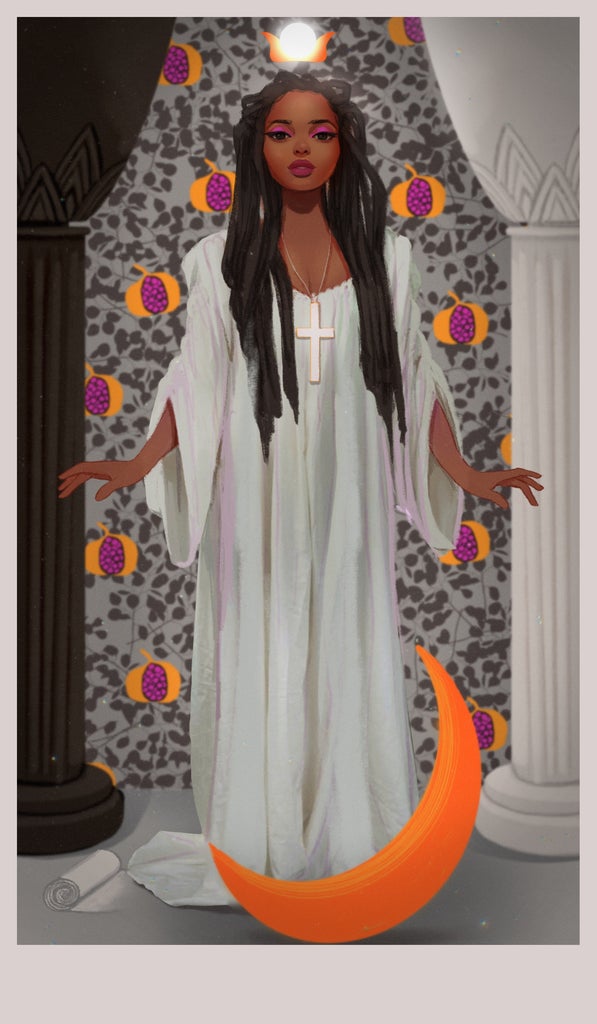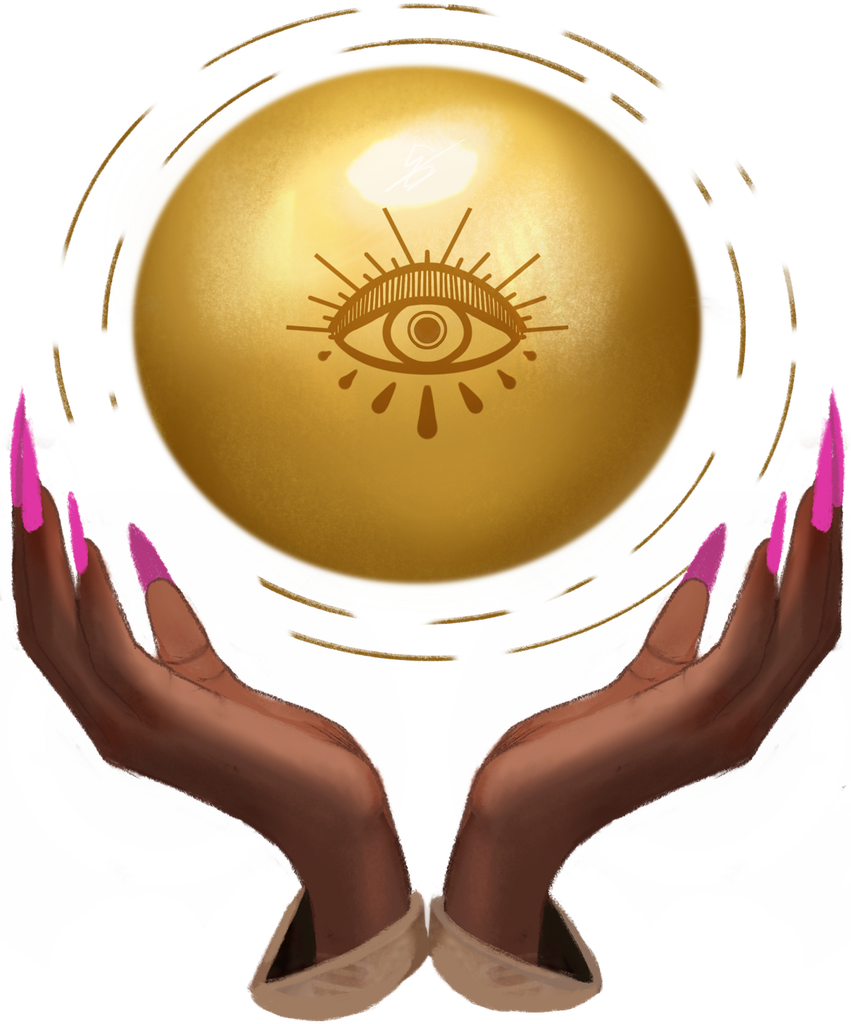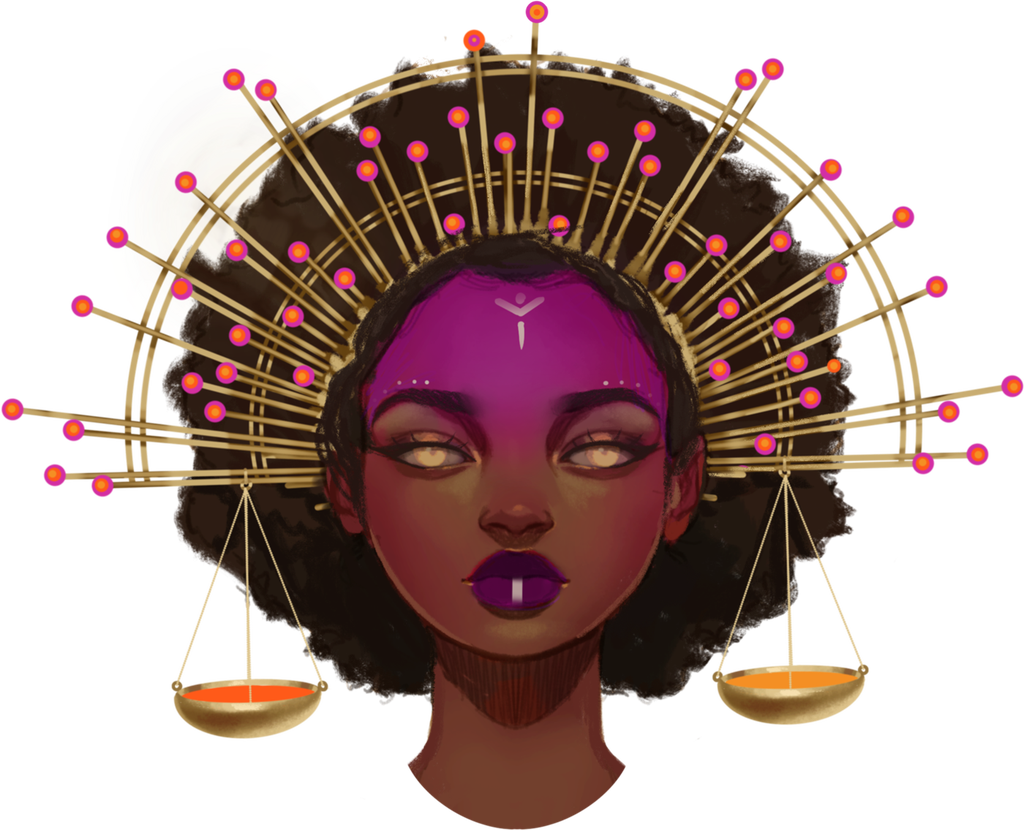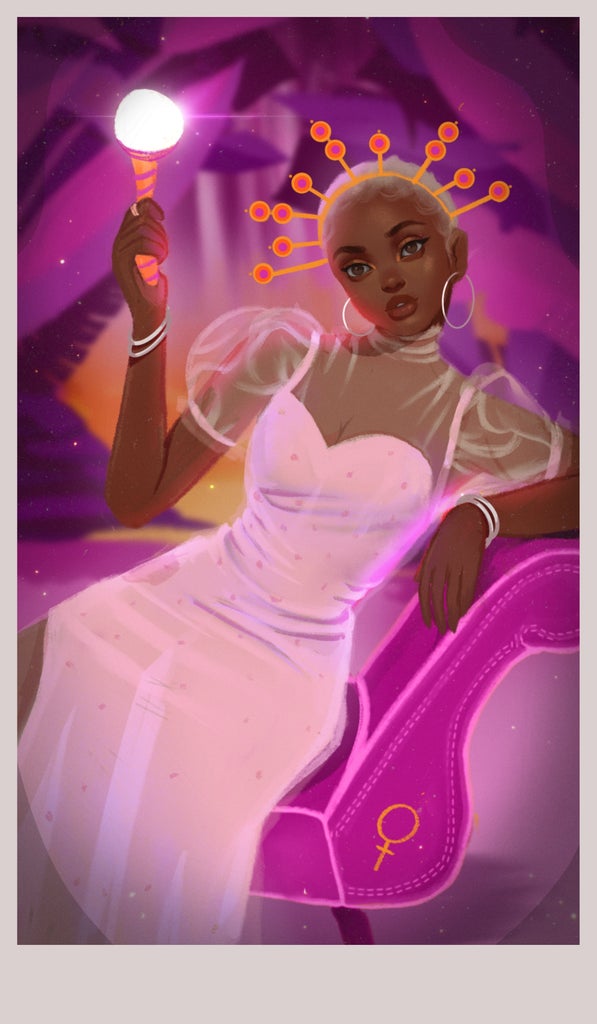
Amber Finney, known as Amber The Alchemist, is steeping a cup of tea when we connect over Google Hangouts. The soft smoke of what is likely sage, incense or palo santo languidly billows from the bottom of her screen. Behind her hangs a tapestry of planets and constellations, as well as a poster illustrating various crystals. Below that sits a table of bottles and oils. Even through a screen, it’s exactly the backdrop you’d expect from someone whose life’s work includes ancestral healing through rituals and magic.
“I am from Hackensack, New Jersey,” Finney, a tarot reader and spiritual practitioner, says. “My grandparents are from Georgia and South Carolina, so I’m a product of the Great Migration.” Her great-great-grandfather was likely born into slavery, she shares, and was a root worker and healer in the 1800s; her mother, Jeannell, has been practising divination for decades. Together, Finney and her mother run Brown Girl Alchemy, an online community dedicated to the ascension and healing of Black womanhood. “[My spirituality has] always been within me,” she states with a smile. “The work that I’m doing and the work that my mom is doing is a continuation [of my great-great-grandfather’s work]. We’re bridging the gap and bringing that spiritualism back to our ancestral.”
Finney and her mother aren’t the only ones. In the last 10 years, and especially amidst the COVID-19 pandemic when many have turned to divination as a means of solace and self-healing, Black and brown women have pivoted from Christianity and reconnected with spiritual practices rooted in African, Indigenous, and Latinx ancestry. Many of those practices — like tarot, astrology, and crystal healing — have become increasingly popular on social media, making conversation surrounding non-Christian Black and brown spirituality less taboo. In pop culture, superstars like Beyoncé have paid homage to figures like the Yoruba Orisha Oshun, goddess of female sensuality and fertility. Songs like Princess Nokia’s “Brujas” have become anthems for Black and brown witches everywhere. But before the age of Twitter, Tumblr, and Instagram, it was rare that you’d find Black and brown women speaking publicly of sacred practices. Until recently, much of the spiritual community represented online featured a more Eurocentric version of divination — “Black and Silver witchcraft,” a term The Hood Witch’s Bri Luna uses to describe the whitewashed “American Horror Story aesthetic” popular on Tumblr years ago — leaving little room for Black and brown women to feel seen or safe in an already stigmatised space. It’s why the spiritual resurgence happening amongst Black and brown women is more than a revival — it’s a reclamation.
“My grandmother practiced hoodoo. She’s from Louisiana and she lived in Texas,” Luna says. “I feel like most American Black families with Southern roots, there’s magic there, regardless of if they wanna call it that or not.” When she first launched The Hood Witch around 2014, the Los Angeles native — who is of Black and Mexican descent — was one of the only brujas representing Black and brown women in the online world of mysticism. “I was sharing metaphysical information; I was sharing tarot; I was sharing things that were already in my family, doing this visual storytelling [in my way]. I really think that opened doors for other women of colour to connect back to their roots. This is something that was long overdue and very necessary.”
In order to understand where spirituality stands today, we look back at where Black spirituality was born, and how our relationship with it has evolved across generations.
The Roots Of Black Diasporic Religion

According to the Pew Research Center, Black Americans are more religious than the American public at-large. Because of this, many — particularly those of older generations — shy away from sharing their non-Christian spiritual practices, lest they risk condemnation from the community. Malorine Mathurin, for example, is a Brooklyn-based intuitive and hellenistic astrologer of Haitian descent, and says she kept her work “under wraps” during her early years as a diviner after being shunned by friends. “I had one friend who actually went and told everyone in junior high school that I was a witch,” she says. “It was very disturbing and very upsetting. People wouldn’t talk to me and would be very wary of me.”
This type of fear-driven response toward non-Christian spirituality is unfortunately typical from those who adhere to institutional Christianity. But, it didn’t have to be like this. As historical texts show, the word “religion” itself is fraught with a colonialist history. “In fact, the term gained popularity in the sixteenth century and was also imposed on native peoples and their practices during conquest and colonising regimes,” says Khytie Brown, ethnographer and scholar of African diaspora religions and African American studies, and a research fellow at Princeton University. “‘Knowledge of God’ was often the Euro-Christian deployment of the term in which non-European peoples and their humanity were judged against,” she says. “That is, to ‘have religion’ meant that these cultures and peoples conformed to European notions of a belief in a higher power, usually a monotheistic one, with accompanying practices that they could approximate and compare with Christianity.”
Although Eurocentric Christianity has often been used as a tool of oppression, Black diasporic religion has long been a beacon in the Black community. Religion is both a spiritual and cultural anchor, as Brown describes, and its many forms offer identity and belonging. “In some sense, these practices predate the rupture caused by the TransAtlantic slave trade,” says Kijan Bloomfield, Assistant Professor of Religious Studies at Rhodes College. “Black religions also developed as a response to the violence of white supremacy. We often describe Black religion in the West as traditions that emerged in the ‘hush harbours’ or spaces that enslaved Blacks gathered in secret to worship and commune beyond the gaze of their white enslavers. However, Black religion also includes Islam and Judaism — both of which are part of a diverse tapestry of Black religious traditions.”
Bloomfield explains that when enslaved Africans were brought to the Americas, they came with their own set of indigenous spiritual and religious practices — including Christianity. As early as 1491, for example, the Kongo Kingdom in Central Africa had adopted Catholicism as its official religion. As a result, some of the people who were enslaved in places like Jamaica and Haiti — where large portions of the enslaved population came from Central Africa, and Kongo specifically — brought with them an African Christian background outside of the Christianity encountered in the new colonies. Conjure and hoodoo (U.S.), vodou (Haiti), and obeah (Jamaica) are all African diasporic religious practices that provided protection and healing. Back in the days of slavery, Black people looked to divination as a salve amid the terror and violence — both physical and psychological — inflicted upon them by entrapment and colonialism.
“Divination is part of this method of accessing knowledge and insight,” Bloomfield adds. “Living in an anti-Black world that continues to denigrate Black existence and ways of knowing, divination provides a powerful tool to ‘see’ and discern the answers to individual and communal problems that are personal and systemic.”
As for tarot and particularly astrology, which is perhaps the most mainstream and widely understood form of divination, Black women have used the stars as their guide for generations. Bloomfield points out that the old spiritual “Follow the Drinking Gourd” is a nod to Harriet Tubman, who used the North Star (the most prominent star in the Big Dipper constellation) to chart the path of the Underground Railroad. And in Octavia Butler’s Parable of the Sower, Bloomfield adds, the protagonist, a Black teenager named Lauren Olamina, develops a belief system called Earthseed. “The ultimate destination, Lauren argues, is for humans to ‘take root amongst the stars’ — to develop a more liberating framework for community and care. Contemporary astrology, I believe, continues a tradition in which Black people have looked to the universe and it’s wonders to circumvent the kind of Enlightenment logic whose ultimate end led to our enslavement and denigration.”
The Seeding Of Stigma Surrounding Non-Christian Spirituality

The term occult — which is from the French word occulte and directly from the Latin occultus meaning “hidden, concealed, secret” — often carries with it a negative connotation. In the Black Christian community in particular, the word is typically used to describe something that is evil or “of the devil.” It’s synonymous with the terms “pagan” and “magic,” both of which were and still are looked down upon in Black religious spaces.
“I believe this is a common impulse and, in many ways, it is misguided,” says Bloomfield. “Religion practiced by Black people throughout the diaspora is syncretic — it draws on African worldviews about power, the spirit world, and the divine that is always in conversation with Christianity. After all, Christianity was a tool of colonialism which enslaved Africans interpolated with their traditional beliefs.”
In Black Magic: Religion and the African American Conjuring Tradition, as Bloomfield notes, author Yvonne Chireau argues that alternative forms of Black religion such as conjure and hoodoo are a complement to African-American Christianity. Bloomfield believes that the suspicion and fear that often shroud divination and occult practices stems from the prominence Christianity achieved within Black diasporic communities, particularly in the U.S. and the Caribbean. “Aligning oneself with Christian values was a strategy to cope with the terror of enslavement and the precarity of Black life, and was also a cloak for more traditional African-derived practices that continued in the New World,” she says. “However, at the apex of the movement for civil rights, Christianity became the primary language to call out the hypocrisy of enslavers and demand justice.”
Finney describes herself and her mother as the “black sheep” of their family, sharing that it wasn’t until this past year when Finney began to receive public attention that she felt comfortable sharing her profession with her family, who are members of the church. “They were like, ‘Okay, somehow you’re accredited, so you must be doing something right,’” she says. “But even still, we don’t talk about it because it’s not for them.”
Afro-Puerto Rican Tarot reader, espiritista, and Ifa Orisha priestess Tatianna Morales — known as Tatianna Tarot — shares a similar story. Born to a Puerto Rican father and a Black mother, Morales says she was raised predominantly by the Puerto Rican side of her family, which is mostly religious with the exception of her father, who is a spiritual medium. “He has studied so many occult and metaphysical topics and is big on personal development, so he and I are like two peas in a pod. This is where I get my juju from.” Her mother’s side of the family, however, is composed of devout Christians, and is “very, very religious.”
“Unfortunately [my mother and I] don’t have a close relationship, but if I were to mention any of this she’d faint and die,” she continues with a laugh. “The irony is that a lot of my gifts come from my Black side of the family. My grandma and my great-great-grandma were practitioners and priestesses in their time in Brooklyn. They did a lot of work for the community [as hairdressers]. So they would essentially mask spiritual workings, spellcasting, and ceremonies that they would do under the guise of them being hairdressers.”
Pandemic Revival & The Future Of Black Mysticism

As the COVID-19 pandemic continues and many people spend more time indoors, the stigma associated with non-Christian, Black religious practices and belief systems is beginning to fade as Black diasporic traditions become more mainstream online. For some, it’s a homecoming. For others, dispelling the negative stereotypes of divination has become a tool of self-healing during a time of loss and trauma.
“The more widespread embrace of Black diasporic traditions I believe is an effort to reclaim ancestral ways of knowing and to assert Black personhood, particularly in the midst of the twin pandemics of COVID-19 and anti-Black racism,” says Bloomfield. Bloomfield’s latest project, Lived Africana Religion in the Time of COVID-19, documents the many ways in which Black communities have sustained their religious practices during this turbulent time in history. “I have learned that communities marginalised by the mainstream Black church — namely Black queer people of faith and practitioners of African traditional religions — have creatively used social media and virtual meeting spaces to reach new audiences and provide opportunities for connection and healing,” Bloomfield says.
“I think, outside the pandemic, there was always a search for spirituality and wanting to connect spiritually, but there had to be a medium because that’s what we’re taught in religion,” says Finney. “The medium is to connect to Jesus or to go to church to connect to the divine, but I think because we are physically not able to step outside of ourselves, we literally had to step within ourselves and initiate our own healing.”
As accessibility to learning resources increases and the online spiritual community continues to grow, Finney says Black and brown women are realizing they never needed a medium. “We’re getting our spiritual swag back because we’re able to recognise that this is what we do. It’s within us. It’s not something that we ever had to seek.”
R29Unbothered continues its look at Black culture’s tangled history of Black identity, beauty, and contributions to the culture. In 2021, we’re giving wings to our roots, learning and unlearning our stories, and celebrating where Black past, present and future meet.
Like what you see? How about some more R29 goodness, right here?
A Letter From Unbothered On Black History Month